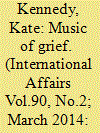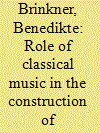| Srl | Item |
| 1 |
ID:
125175


|
|
|
|
|
| Publication |
2013.
|
| Summary/Abstract |
The future of classical music is almost universally thought bleak. Attendance figures are dropping, and some even question whether it is possible to write new classical music that concertgoers will be able to appreciate. This essay locates the origins of such doomsday prophecy in unquestioned assumptions and seeks to establish just the opposite: that classical music is alive and vibrant, that new creative horizons are constantly opening up, and that audiences will actually enjoy many contemporary classical compositions. The key is to present these unfamiliar works as they are understood by their composers: in a context that allows listeners to make connections between the familiar and unfamiliar, opening their minds to a wealth of new human experience.
|
|
|
|
|
|
|
|
|
|
|
|
|
|
|
|
| 2 |
ID:
131431


|
|
|
|
|
| Publication |
2014.
|
| Summary/Abstract |
The First World War involved composers just as it involved writers. We rarely hear, however, about the classical music that was written during the war, or after it, while for generations now the war has been remembered through the literature of the war poets and the memoirs of the late 1920s (Vera Brittain's Testament of youth, or Siegfried Sassoon's Memoirs of an infantry officer, for instance). This article aims to put composers alongside their literary counterparts, to present a fuller picture of cultural responses to the conflict. It looks at works by Edward Elgar, Ivor Gurney, Herbert Howells, Patrick Hadley, Gerald Finzi, John Foulds, Frank Bridge and in particular at Arthur Bliss's symphony on war, Morning heroes. It charts the changing responses of music to the war from the first patriotic statements to the requiems of the postwar years. It looks at compositions by civilians, and by composers who served abroad, to examine how classical music is uniquely placed to commemorate, inspire and mourn.
|
|
|
|
|
|
|
|
|
|
|
|
|
|
|
|
| 3 |
ID:
084899


|
|
|
|
|
| Publication |
2008.
|
| Summary/Abstract |
Very little research has been conducted into the relationship between classical music and nationalism. This is a shame as music has played a significant role in the construction and consolidation of nationalism in many European countries. This article illustrates this by analysing the role of classical music and, in particular, contemporary serious music in the construction of Danish consensus nationalism in the 1930s and 1940s. In so doing, it explores the repression of the modernist expression which was and still is considered a Continental European phenomenon in favour of a local and traditional expression. Furthermore, it analyses the elevation of Carl Nielsen to the position of Danish composer par excellence.
|
|
|
|
|
|
|
|
|
|
|
|
|
|
|
|